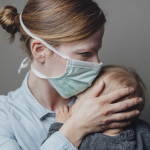There have been multiple studies over last year showing increased anxiety and depression in certain populations as a result of the COVID pandemic. It is clear that some members of the population may be more susceptible to psychological distress than others. From our clinical vantagepoint, it is clear that the parents of young children have been particularly affected by the pandemic. Using surveys of women participating in the All Our Families pregnancy cohort in Canada, a new study gives us some information on how mothers caring for children at home have been doing in the midst of the pandemic.
The All Our Families study is a longitudinal observational study, where a cohort of 3,200 mother-baby pairs from Alberta, Canada who were recruited during pregnancy in 2008 and have been followed since that time. Women enrolled in the All Our Families study were invited to complete a COVID-19 impact survey between May 20 and July 15, 2020. Depression (assessed using the 10-item Center for Epidemiological Studies Depression scale or CES-D) and anxiety symptoms (assessed using the short form of the Spielberger State-Trait Anxiety Inventory) during the COVID-19 pandemic were compared to three previous assessments of the cohort (at 3, 5, and 8 years). Repeated cross-sectional analyses were performed in order to assess changes in these symptoms over time, and fixed-effects regression models were used to assess within-person changes over time.
A total of 2445 women were eligible and were invited to participate in the COVID-19 impact study; 1333 consented to participate, and 1301 were included in the final analysis of data. When assessed during the COVID-19 pandemic, the mean depression score was 8.31, and 35.2% of the women reported clinically significant depressive symptoms, which is significantly higher than observed at the previous three timepoints (see figure below).
At the COVID-19 pandemic assessment, the mean anxiety score was 11.9, and 31.4% of the women had clinically significant anxiety symptoms, which is significantly higher than observed at the previous three timepoints (see figure below). At the COVID-19 assessment, they also observed a positive association between total depression and anxiety scores, such that 21.8% of the mothers reported both clinically significant depression and anxiety symptoms.
The largest increases in depression and anxiety symptoms were observed for women who had income disruptions, difficulty balancing at-home schooling with work responsibilities, and those with difficulty obtaining childcare. White mothers had greater increases in anxiety scores than non-white mothers. In contrast, history of mental illness appeared to have minimal impact.
This study shows high rates of depression and anxiety during the early months of the pandemic among mothers with children at home and confirms what we have seen clinically. Mothers are stretched thin and are struggling to continue working while at the same time supporting their children. Although we usually see a history of depression or anxiety as a factor which increases vulnerability during times of stress, this study indicates that increases in depression and anxiety are strongly driven by stressors related to disruptions in work and financial security, juggling work and at-home schooling, and not having childcare.
This is yet another study which makes clear that the pandemic has had a profound effect on our mental health. While we were unprepared for the pandemic, we can only hope that we are better prepared to support and take care of the mental health of moms and their families.
Ruta Nonacs, MD PhD
Racine N, Hetherington E, McArthur BA, McDonald S, Edwards S, Tough S, Madigan S. Maternal depressive and anxiety symptoms before and during the COVID-19 pandemic in Canada: a longitudinal analysis. Lancet Psychiatry. 2021 Mar 24.








Leave A Comment